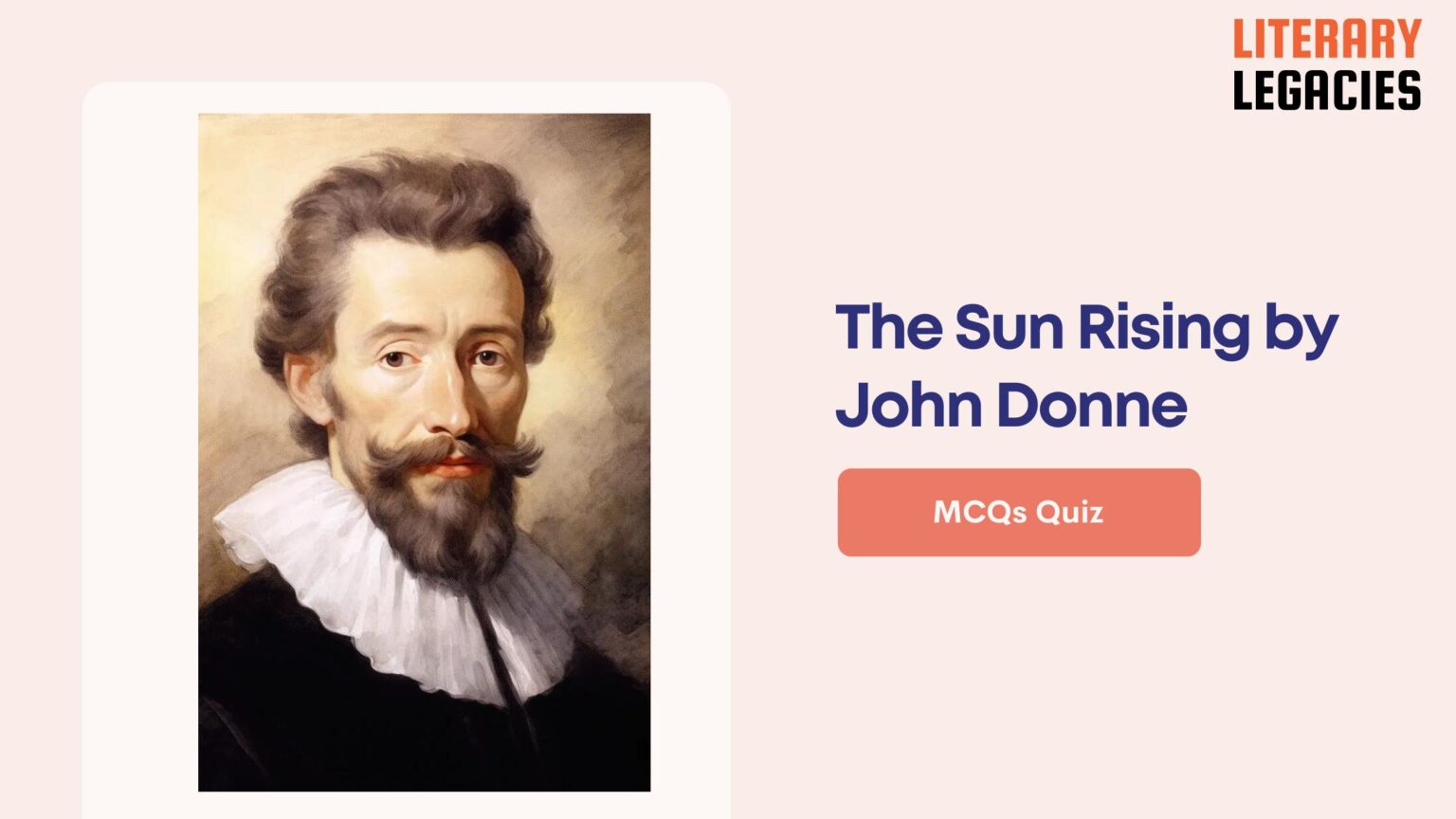1. What does the speaker imply about the sun’s role in love?
A. The sun creates obstacles for lovers.
B. The sun is indifferent to the existence of love.
C. The sun helps organize lovers’ schedules.
D. The sun is essential for love to flourish.
Answer: The sun creates obstacles for lovers. (A)
The speaker criticizes the sun for interfering with love and disrupting lovers’ time.
2. In comparing love to the influence of time, what does the speaker suggest?
A. Love is a fleeting emotion.
B. Love is only valid during certain hours.
C. Time is more valuable than love.
D. Love is eternal and unaffected by time.
Answer: Love is eternal and unaffected by time. (D)
The speaker indicates that love transcends the limitations of time.
3. What metaphor does the speaker use to describe the insignificance of worldly honors compared to love?
A. Honors are fleeting like dust.
B. Honors are the fabric of life.
C. Honors are like shadows.
D. Honors are cheap copies of love.
Answer: Honors are cheap copies of love. (D)
The speaker considers worldly honors as inferior when compared to the depth of love.
4. What does the speaker believe the sun should do instead of shining on them?
A. Maintain a quiet presence.
B. Support worldly duties.
C. Travel across the skies.
D. Enforce the start of daily routines.
Answer: Maintain a quiet presence. (A)
The speaker suggests that the sun should take it easy and not interfere with their love.
5. How does the speaker view the relationship between love and geography?
A. Geography determines the strength of love.
B. Love is bound by location.
C. Love is limited to one’s homeland.
D. Love transcends physical boundaries.
Answer: Love transcends physical boundaries. (D)
The speaker indicates that love encompasses all places, suggesting it knows no geographic limitations.
6. Which of the following best represents the speaker’s opinion about the sun’s brightness?
A. It should be worshipped.
B. It is admired by everyone.
C. It is essential for life.
D. It disrupts private moments.
Answer: It disrupts private moments. (D)
The speaker expresses frustration that the sun’s brightness interferes with romantic moments.
7. What does the speaker imply about their bond with their lover?
A. It demands constant attention.
B. It makes them forget the outside world.
C. It is restrictive and limiting.
D. It is dependent on external events.
Answer: It makes them forget the outside world. (B)
The speaker views their love as all-encompassing, making the outside world irrelevant.
8. What does the phrase ‘the whole world fits here in the bedroom’ signify?
A. The bedroom is a prison.
B. Physical space defines love’s boundaries.
C. The lovers elevate their personal space to global significance.
D. The outside world is more important than their love.
Answer: The lovers elevate their personal space to global significance. (C)
The speaker suggests that their love is so profound that it makes their intimate space feel vast and significant.
9. What attitude does the speaker express toward the sun’s demands on human schedules?
A. They find the sun’s demands necessary.
B. They reject any influence of the sun on their lives.
C. They support the sun’s role in organizing society.
D. They appreciate the sun’s punctuality.
Answer: They reject any influence of the sun on their lives. (B)
The speaker clearly displays a disregard for the sun’s role in influencing their schedules and lives.
10. What does the speaker suggest about the sun and their romance?
A. The sun creates challenges in their relationship.
B. The sun provides only warmth, not happiness.
C. The sun should be more involved in romance.
D. The sun can shine elsewhere since their love is enough.
Answer: The sun can shine elsewhere since their love is enough. (D)
The speaker suggests that the sun’s presence is not needed for their romance to thrive.
11. What does the speaker suggest about the sun’s authority?
A. The sun has absolute authority over lovers.
B. The sun should be obeyed by lovers.
C. The sun governs the time spent in bed.
D. The sun is foolish to think it has power over love.
Answer: The sun is foolish to think it has power over love. (D)
The speaker views the sun as foolish and believes love has greater authority.
12. How does the speaker describe the sun in the opening lines?
A. As an unruly servant.
B. As a wise guide for lovers.
C. As a busy old fool.
D. As an essential force for timekeeping.
Answer: As a busy old fool. (C)
The speaker uses the phrase ‘busy old fool’ to diminish the sun’s significance.
13. What action does the speaker imply could diminish the sun’s impact?
A. Pulling the curtains.
B. Closing his eyes.
C. Getting out of bed.
D. Ignoring its rays.
Answer: Closing his eyes. (B)
The speaker suggests that merely closing his eyes could block the sun’s influence.
14. What does the speaker wish for in relation to the sun’s daily motion?
A. To be governed by the sun’s cycles.
B. To follow the sun’s schedule.
C. To manipulate the sun’s position.
D. To align love with the sun’s rhythm.
Answer: To manipulate the sun’s position. (C)
The speaker expresses a desire to manipulate time by controlling how the sun functions.
15. What does the speaker mean by love being ‘unfamiliar with the rags of time’?
A. Love exists only in moments.
B. Love is ultimately governed by time.
C. Time does not affect love’s endurance.
D. Love is limited by time.
Answer: Time does not affect love’s endurance. (C)
This phrase suggests that love transcends conventional time constraints.
16. In what way does the speaker elevate the importance of love?
A. By advocating work over love.
B. By illustrating its temporary nature.
C. By asserting it as a seasonal obligation.
D. By contrasting it with a natural schedule.
Answer: By contrasting it with a natural schedule. (D)
The speaker contrasts love’s significance with the natural daily rhythms dictated by the sun.
17. How does the speaker express their feelings towards the routines of others?
A. They respect the routines of students and workers.
B. They believe routines are essential for life.
C. They find those routines to be tiresome.
D. They think routines are synonymous with love.
Answer: They find those routines to be tiresome. (C)
The speaker shows little respect for the routines of others, viewing them as tiresome.
18. What future does the speaker envision for the lovers?
A. Being subject to societal norms.
B. Being separate from temporal constraints.
C. Being constantly watched by the sun.
D. Being governed by the whims of nature.
Answer: Being separate from temporal constraints. (B)
The speaker envisions a future for lovers that is not restricted by time or duties.
19. What does the speaker achieve by the end of the poem regarding the world and the sun?
A. Elevates the sun’s power in society.
B. Extends the sunlight to illuminate new realms.
C. Contracts the world to their bedroom.
D. Transforms the world into a vast landscape.
Answer: Contracts the world to their bedroom. (C)
The speaker minimizes the world to the confines of their bed, emphasizing love’s dominance.
20. What role does the speaker aspire the sun to take by the end of the poem?
A. As an authoritative figure of nature.
B. As a source of warmth for lovers.
C. As a constant reminder of time.
D. As an observer of love.
Answer: As a source of warmth for lovers. (B)
The speaker desires the sun to warm the lovers as they remain in bed.
21. What does the term ‘microcosm’ refer to in the context of ‘The Sun Rising’?
A. The lovers’ relationship as a reflection of societal values
B. The human body as a miniature model of the universe
C. The concept of time affecting love
D. Nature’s influence on human emotions
Answer: The human body as a miniature model of the universe (B)
‘Microcosm’ refers to the idea that the human body represents a small-scale version of the universe.
22. How does the speaker transform his relationship with his lover in the poem?
A. By claiming they are sources of imperial wealth
B. By equating their love to the power of the sun
C. By suggesting they are rulers of their own kingdom
D. By dismissing the importance of worldly matters
Answer: By suggesting they are rulers of their own kingdom (C)
The speaker claims that their love makes them rulers of their universe, elevating their status.
23. What significance does the reference to ‘both th’ Indias of spice and mine’ hold?
A. It emphasizes the lovers’ joint wealth and power
B. It reflects the competition between different empires
C. It highlights the connection between geography and love
D. It illustrates the destructive nature of colonization
Answer: It emphasizes the lovers’ joint wealth and power (A)
The reference underscores that the wealth and imperial power associated with the Indias are now part of their intimate bond.
24. What does the speaker suggest happens to the power of kings in the poem?
A. They are honored through praises of the sun
B. They are diminished by the lovers’ desires
C. They are displaced into the lovers’ bed
D. They become irrelevant in the face of love
Answer: They are displaced into the lovers’ bed (C)
The speaker suggests that the influence and power of kings are symbolically included in their love.
25. What is implied by the phrase ‘All here in one bed lay’?
A. The empires’ power is concentrated in their intimacy
B. The bed symbolizes the struggles of power dynamics
C. The lovers physically contain the entire universe
D. The speaker believes kings belong only in their dreams
Answer: The empires’ power is concentrated in their intimacy (A)
The phrase implies that the power of various empires is absorbed into the bed shared by the lovers.
26. Which theme is particularly emphasized through the transformation of the speaker?
A. The detachment from societal expectations
B. The isolation of love from the outside world
C. The sovereignty of love over earthly matters
D. The impossibility of sustaining love through time
Answer: The sovereignty of love over earthly matters (C)
The transformation highlights love’s dominance over traditional power structures.
27. What does the speaker ultimately want to convey regarding their relationship?
A. It struggles against outside forces of nature
B. It diminishes the need for external validation
C. It is a fleeting moment with worldly distractions
D. It transcends the limitations of time and space
Answer: It transcends the limitations of time and space (D)
The relationship is portrayed as all-encompassing, extending beyond time and physical boundaries.
28. What does the statement ‘Nothing else is’ signify in the poem?
A. The insignificance of all other relationships
B. The urge to escape from reality
C. The centrality of their relationship in the universe
D. The value of solitude over companionship
Answer: The centrality of their relationship in the universe (C)
This statement underscores that their love is the most important aspect of existence.
29. How is love described in terms of its relationship to the physical world?
A. As a destructive force that breaks apart empires
B. As something that seems to surpass the world’s realities
C. As a physical manifestation of imperial power
D. As a fleeting emotion tied to material wealth
Answer: As something that seems to surpass the world’s realities (B)
Love is depicted as transcending the physical and imperial limitations of the world.
30. What overarching role does the speaker claim for himself through his comparison to rulers?
A. To assert dominance over all worldly affairs
B. To diminish the roles of rulers in society
C. To challenge the legitimacy of royal power
D. To serve as a reminder of past imperial glories
Answer: To assert dominance over all worldly affairs (A)
The speaker embodies the idea that love grants him a ruling power greater than any king.
31. How does the speaker justify his commands to the sun?
A. He believes his importance surpasses that of earthly princes.
B. He thinks the sun is merely a servant to all humans.
C. He believes the sun should obey him out of love.
D. He sees himself as a ruler above the natural order.
Answer: He believes his importance surpasses that of earthly princes. (A)
The speaker inflates his own importance by asserting that his power exceeds that of any king, thus justifying his commands to the sun.
32. What comparison does the speaker make to underline his power over the sun?
A. He compares the sun’s duties to those of the court huntsmen.
B. He compares his authority to that of a governmental figure.
C. He compares himself to a king giving orders to subjects.
D. He compares his love to the power of nature.
Answer: He compares the sun’s duties to those of the court huntsmen. (A)
The speaker draws a parallel between the way the sun is made to serve him and how the court huntsmen serve the king.
33. What is the speaker’s view on the relationship between love and power?
A. True power is rooted in the connection of love.
B. Love is a temporary distraction from authority.
C. Power is more valuable than love.
D. Love diminishes the importance of power.
Answer: True power is rooted in the connection of love. (A)
The speaker believes that the authority granted by love is superior to any political power.
34. What does the speaker imply about political rulers in relation to love?
A. They undermine the power of love.
B. They are crucial to the structure of society.
C. They are merely performing acts like players.
D. They have more authority than lovers.
Answer: They are merely performing acts like players. (C)
The speaker suggests that real princes only mimic the nature of lovers, relegating them to a lesser role.
35. What is meant by the speaker’s assertion that ‘Princes do but play us’?
A. Kings do not understand the true essence of love.
B. Princes are more serious and less playful than lovers.
C. Lovers have a more profound connection than political figures.
D. Political power is more about appearance than substance.
Answer: Political power is more about appearance than substance. (D)
This statement reflects the speaker’s belief that the endeavors of princes are superficial compared to the genuine connection of lovers.
36. How does the speaker’s perception of the ‘microcosm of the bed’ relate to love?
A. It symbolizes the limitations placed on romantic relationships.
B. It restricts the power of love to a small space.
C. It reduces the significance of passion to mere playfulness.
D. It elevates love as an encompassing force beyond worldly concerns.
Answer: It elevates love as an encompassing force beyond worldly concerns. (D)
The speaker uses the idea of their bed as a microcosm to illustrate that love holds immense power over them and can redefine the universe.
37. What effect does the speaker seek by assigning ‘duties’ to the sun?
A. To suggest that love is more important than light.
B. To elevate his own status above natural forces.
C. To demonstrate the relationship between man and nature.
D. To minimize the sun’s role in the human experience.
Answer: To elevate his own status above natural forces. (B)
By assigning duties to the sun, the speaker aims to showcase his dominance over natural forces, positioning himself at a higher status.
38. What underlying theme can be inferred from the speaker’s attitudes towards kings and princes?
A. They are as powerful as true lovers.
B. They are unnecessary in the existence of true love.
C. They are inherently flawed and ineffective.
D. They possess the ultimate wisdom and strength.
Answer: They are unnecessary in the existence of true love. (B)
The comparison implies that the existence of true love makes the roles of princes and kings redundant or less relevant.
39. Which aspect of the natural order does the speaker challenge with his assertions?
A. The law of gravity.
B. The predictability of the seasons.
C. The power dynamics between the sun and lovers.
D. The influence of the moon on tides.
Answer: The power dynamics between the sun and lovers. (C)
The speaker challenges the traditional power dynamics by claiming authority over the sun, positioning it as subordinate to his love.
40. What does the speaker achieve by placing the world into the microcosm of the bed?
A. He creates a new perspective on power and authority.
B. He diminishes the influence of time on lovers.
C. He showcases the limitations of romantic relationships.
D. He reinforces the importance of societal roles.
Answer: He creates a new perspective on power and authority. (A)
By establishing the bed as a microcosm, the speaker redefines perspectives on power, suggesting that love has greater authority than any political figure.



